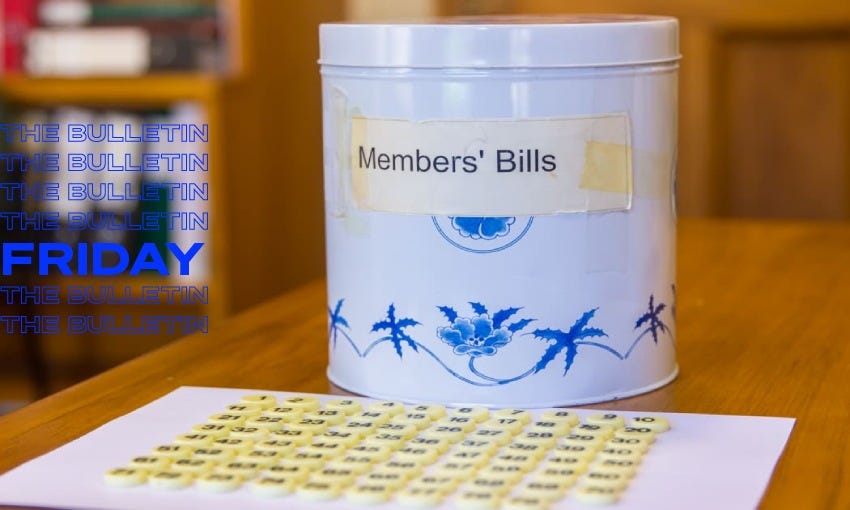Biscuit tin says yes on another electoral reform bill
Three weeks after an electoral reform bill from Green MP Golriz Ghahraman was drawn, Rawiri Waititi struck it lucky with his bill yesterday.
Mōrena and welcome to The Bulletin for Friday, June 10, by Anna Rawhiti-Connell. Presented in partnership with Z Energy.
In today’s edition: government to ease lending rules; school attendance strategy launched; investigation into Alan Hall conviction; but first, second electoral reform bill drawn.
A DEKA purchase from the nineties (Photo: Supplied / Office of the Clerk)
Te Pāti Māori electoral amendment bill drawn
Rawiri Waititi’s member’s bill, the Electoral (Right to Switch Rolls Freely) Amendment Bill was drawn from the tin yesterday. The bill will allow Māori to change between the Māori and general electoral rolls at any time. Currently switching rolls can be done during a four-month window every five or six years. Te Pāti Māori say support for the legislation is a bottom line for working with any coalition partner heading into the next election. Golriz Ghahraman’s Electoral Strengthening Democracy Amendment Bill was drawn in May. It also proposes enabling Māori to switch electoral roles at any time.
Government making same proposal
Te Pāti Māori’s bottom line won’t be an impediment to working with Labour. Waititi’s bill was drawn on the same day as justice minister Kris Faafoi announced a proposal to make it easier for Māori to change whether they vote for candidates in Māori or general electorate seats. The work is part of Labour’s 2020 election promise to ensure our electoral laws are fit for purpose. "I'll point out that we have three justice select committees spanning this government, the previous government, and the government before that have said it's the right thing to do. Its time has come" said Faafoi.
Change requires support from National party
This change, which will be introduced to the house via a bill in the coming weeks, requires support from 75% of parliament meaning the National party needs to support it. The party’s justice spokesperson Paul Goldsmith said they wouldn’t support the proposal in its current form as it could be gamed. Goldsmith said people could switch rolls in a by-election or at the general election to vote in marginal seats. They are suggesting excluding roll switching three to four months before general and local government elections.
What are the chances!
“I am ecstatic! I mean, what are the chances to have one bill from a party of two being drawn out of 64 others” said Waititi. I mean, what are the chances of two bills around electoral reform being drawn from the biscuit tin while the government is also conducting an electoral reform review! Absolutely no suggestion of conspiracy here. The biscuit tin is beyond reproach, it was bought from the once-great DEKA, but perhaps this rare occurrence does suggest it’s time for some proper debate about improving democracy. For what’s worth, I would genuinely love someone to look at whether bills containing such similar proposals have been drawn in such a short space of time before.
New Zealand’s economy and society is dependent on oil; every day the country uses around 23 million litres. On April 1 New Zealand moved to a 100% refined fuel import model with the closure of the Marsden Point oil refinery. This has changed the way Aotearoa manages its fuel supply security, in order to ensure that supply can withstand disruptions to the market – like the ongoing war in Ukraine. But while we no longer have the capability to refine oil locally, according to Z Energy our fuel supply is now more diversified – and coming from refineries geographically closer than our traditional supply of crude oil. Read more about where our fuel comes from on The Spinoff. (Sponsored)
Lending rules to be loosened, banks say they’re still too tight
The Government confirmed it would loosen rules under the Credit Contracts and Consumer Finance Act (CCCFA). The rules were introduced to protect people from predatory lenders but had adverse consequences when applied, resulting in banks needing to go through people’s spending line by line. The rules prompted stories of first time buyers trying to create an appearance of extreme austerity by withdrawing cash from supermarkets so spending wouldn't turn up on bank statements. The banks still don’t think the fixes will sort things. New Zealand Bankers' Association chief executive Roger Beaumont said "Most of the existing requirements remain in place, meaning customers will still have to provide detailed information about their spending, resulting in a more painstaking process and more loan applications being declined than before the December rule change."
School attendance levels at lowest they’ve been in nearly a decade.
Yesterday the government announced a new attendance strategy and targets. It wants 70% of children attending school regularly by 2024 and 75% by 2026. I spoke with a school counsellor at a large Auckland high school last year and he mentioned that some kids were having to choose between working to help out with household expenses or going to school. Recent research from the Education Review Office (ERO) confirmed this, especially for pacific students. I listened to an interview Kathryn Ryan did recently on the new school funding system. Attendance came up (22 minutes in). Secondary Principals' Association president Vaughan Couillault said it was actually everyone’s job to make sure our kids were engaged with education which I think is also a fair call.
A message from senior writer Alex Casey:
Earlier in the year we published When the Lessons End, an in-depth examination of one woman’s experience at the hands of her private music teacher, and the impact it had on the rest of her life. Stories like these take months of rigorous reporting, travel costs and hefty legal fees to get to publication stage, all of which was only possible thanks to our members.
I feel so lucky to work for an organisation that encourages long-form investigative journalism, but the reality is that this work is impossible without the ongoing support of our readers. If you can, please support our work by donating today.
Investigation into the Crown's role in the miscarriage of justice
The Solicitor-General has appointed Nicolette Levy, QC, to lead the investigation into the conviction of Alan Hall. Hall spent 19 years in prison for the murder of Arthur Easton. The Supreme Court quashed his conviction on Wednesday saying it was a miscarriage of justice and accepted that that there was intentional alteration of a key witness’s statement. Investigator Tim McKinnel spoke to RNZ’s Checkpoint saying "What a complete waste of a large part of Alan's life - it's tragic." Hall’s mother sold the family home to help fund the legal work to get the conviction overturned and died in 2012. The family of Easton have said they’re “shaken and appalled” that evidence was manipulated in order to convict a man for their father’s death.
Got some feedback about The Bulletin, or anything in the news? Get in touch with me at thebulletin@thespinoff.co.nz
After decades with only rudimentary internet, Chatham Islanders now have high-speed access and 4G cellphone services. Shanti Mathias went there to discover how connection has shaped everyday life for IRL. Duncan Greive charts the "milkshake ducking" of a viral supermarket owner. Reweti Kohere finds out why the New Zealand Aids Foundation was renamed the Burnett Foundation Aotearoa this week. Taualofa Totua reviews the poignant first episode of Three's rugby reality show Match Fit, which features the late Va’aiga Tuigamala. Don Rowe learns about an East Coast effort to bring locally-grown bananas to the table.
What’s the Japanese word for ruck?
Rugby is played in countries all over the world where English isn’t the first language. And yet I have never paid attention to whether the language of rugby remains dominantly English in all of them and what that must be like for players who don’t speak it fluently or at all. Researchers are setting out to establish the words and phrases commonly used in rugby in English with the goal of creating technical word lists to help native and non-native English speakers prepare for playing, coaching and talking about rugby in foreign environments.
It’s Friday so…
If you’ve ever thought your unborn child might have something in common with flatpack furniture, you can now get some help from IKEA in naming them. The Scandinavian furniture company has created a name bank of all the names of its products over the years to help parents find new names for their children. It’s on the Norwegian IKEA website which I have managed to decipher using Google translate but it’s actually worth a look if only for a retrospective of 79 years of scandi furniture.











